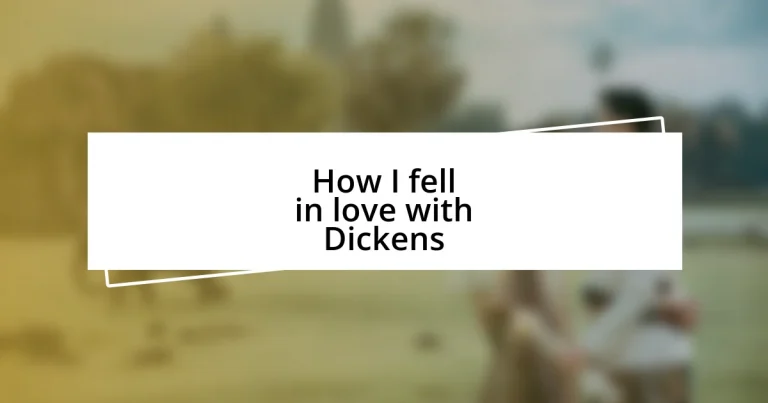Key takeaways:
- Charles Dickens’ literature explores universal themes such as love, loss, social justice, and human resilience, drawing readers into the emotional depths of his characters’ struggles.
- Key themes in Dickens’ works include social criticism, individual versus societal expectations, and the potential for redemption, as seen in novels like “Hard Times,” “David Copperfield,” and “A Christmas Carol.”
- For beginners, recommended starting points include “Great Expectations,” “A Christmas Carol,” and “Oliver Twist,” all of which illustrate personal growth, compassion, and social justice, encouraging reflection on one’s own values and society.
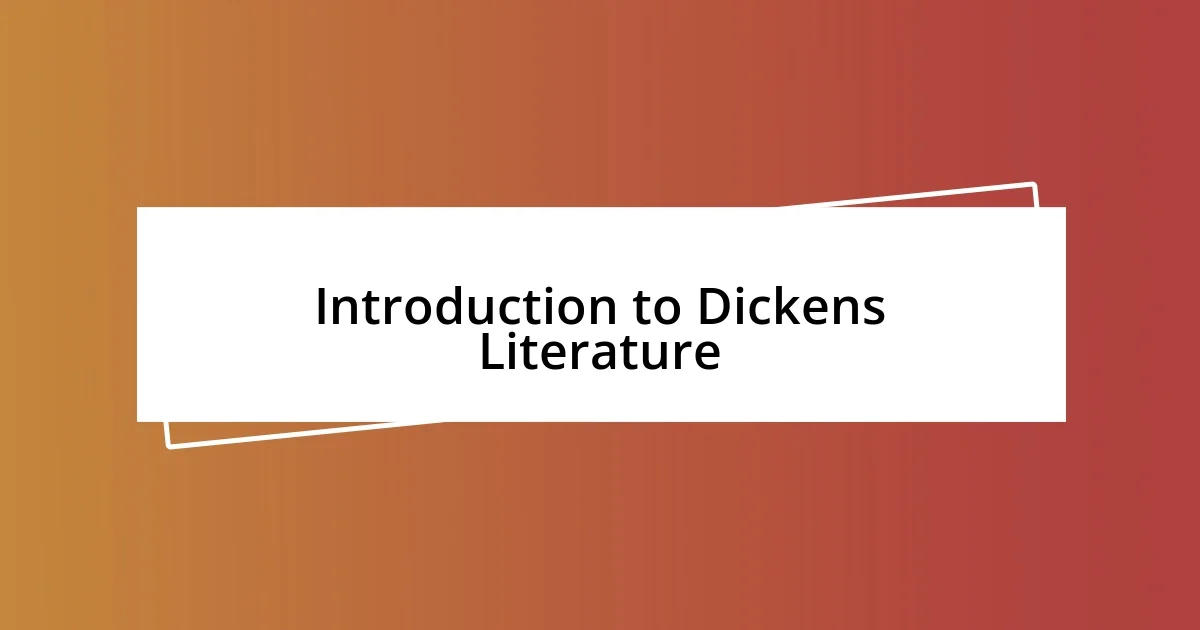
Introduction to Dickens Literature
Charles Dickens, one of the most significant literary figures of the Victorian era, crafted stories that resonate with universal themes of love, loss, and social justice. I remember the first time I picked up “Great Expectations”; the vivid characters leaped off the page, drawing me into their lives with such intensity that I felt I was sharing their joys and sorrows firsthand. Isn’t it fascinating how a novel can transport you to another time and place, making you feel so deeply connected to its characters that their struggles become your own?
His powerful storytelling often reflects the harsh realities of 19th-century England, tackling issues like poverty and inequality. I could hardly shake off the emotions stirred by “Oliver Twist” when I realized how relevant its themes still are today. It left me questioning, how much have we really progressed? Through the lens of Dickens’ work, we not only witness a critical social commentary but also an exploration of human resilience.
As I delved deeper into his novels, I found that Dickens’ meticulous attention to detail and his ability to create memorable characters truly set him apart. Each figure, whether they’re a charming rogue or a heart-wrenching victim, beckons the reader to reflect on their own lives. Have you ever felt such a connection with a book that it changed your perspective? That’s precisely what Dickens’ literature does; it invites us to examine our own humanity and the society we inhabit.
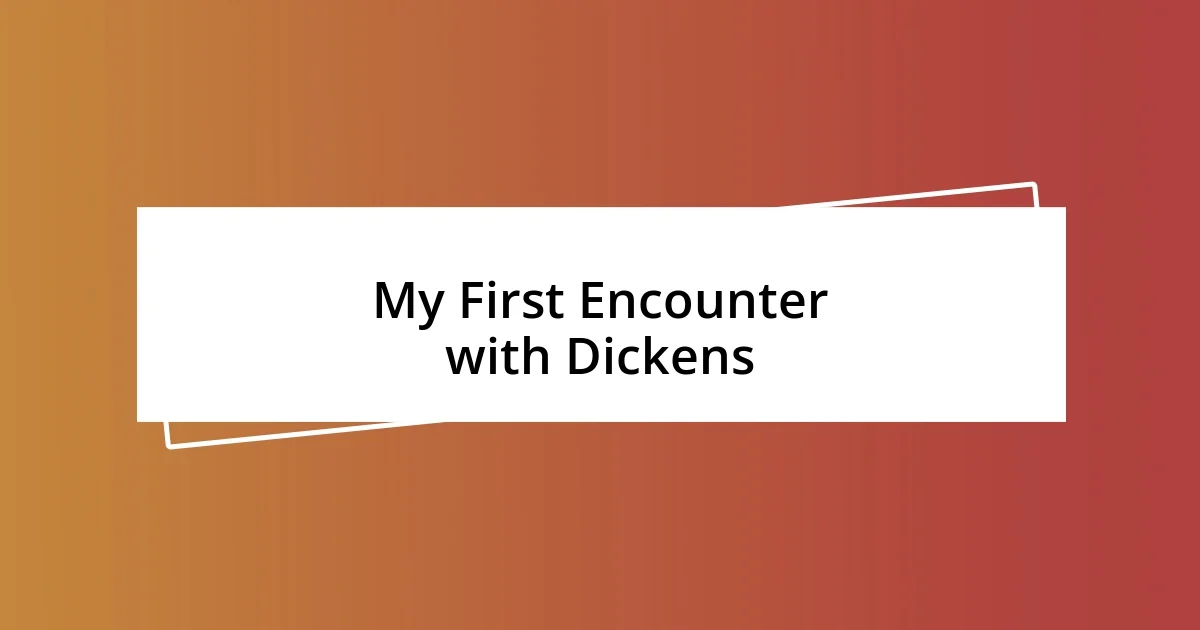
My First Encounter with Dickens
My introduction to Dickens was unexpected, and it happened on a rainy afternoon when I stumbled upon a worn copy of “A Tale of Two Cities” at a local thrift store. The captivating opening line, “It was the best of times, it was the worst of times,” struck me. I was intrigued, and as I began to read, I could almost hear the raindrops outside sync with the rising tension in the story. It wasn’t just the plot that gripped me; it was the way Dickens painted the era with his words that pulled me in.
- I recall feeling a profound sense of empathy for Sydney Carton, a character whose complexity made me reflect on my own choices and regrets.
- Reading Dickens felt like connecting with an old friend, inviting me into a world where every character had a story to tell.
- Each page seemed to reveal a piece of myself that I hadn’t acknowledged, fostering a desire to understand not only the author but also myself.

Key Themes in Dickens Works
Dickens masterfully interweaves themes of social criticism throughout his works. For instance, in “Hard Times,” I found myself reflecting on the stark contrast between industrial progress and the human cost it incurs. It was a poignant reminder that every advancement comes with its own set of sacrifices, often unseen by those who benefit most from it.
One theme that consistently resonated with me is the struggle of the individual against societal expectations. In “David Copperfield,” I watched as David navigated life’s challenges, reminding me of my own battles against norms while pursuing my dreams. This theme of self-discovery is powerful; it encourages readers to ponder how much society molds us, and whether we should rebel against its constraints.
Lastly, the notion of redemption stands out remarkably in Dickens’ narratives. Consider the transformation of Ebenezer Scrooge in “A Christmas Carol.” I still remember how his journey from cynicism to charity stirred my belief in the potential for change in anyone. Dickens demonstrates that redemption isn’t just a possibility; it’s a powerful driving force, urging us to embrace compassion.
| Theme | Example Work |
|---|---|
| Social Criticism | Hard Times |
| Individual vs. Society | David Copperfield |
| Redemption | A Christmas Carol |
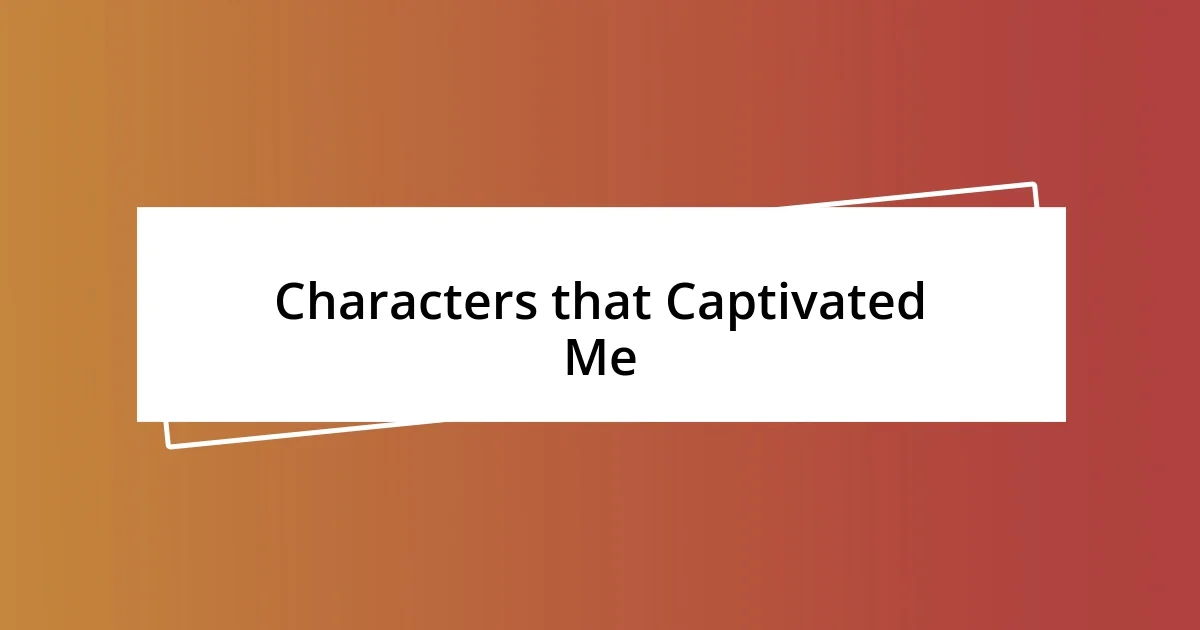
Characters that Captivated Me
I vividly remember the first time I met Oliver Twist. His innocence and vulnerability captured my heart almost instantly. I found myself rooting for him, feeling a surge of protective instinct that made me wonder—how often do we overlook the fragility of those around us in our daily lives?
Then there’s Miss Havisham from “Great Expectations.” Her tragic story of love and loss resonated deeply with me. I couldn’t help but feel a kinship with her in moments when life seemed to stand still. Her character made me reflect on the consequences of clinging to the past; isn’t it fascinating how we all have a Miss Havisham inside us at times, holding tight to old sorrows?
Lastly, let’s talk about the heart and humor of Mr. Micawber. His unwavering optimism amid financial chaos tickled my spirit and made me reconsider my own outlook on hardships. I often wondered—how could someone maintain such hope? His spirit taught me that sometimes, it’s our attitude towards our struggles that makes all the difference. Dickens certainly excels at crafting characters who persist in my thoughts long after the last page has turned.

How to Dive into Dickens
Diving into Dickens feels like embarking on a journey through time, and I recommend starting with a good edition that includes context about the era he wrote in. I remember picking up a beautifully annotated version of “A Tale of Two Cities” and finding the footnotes illuminating, helping me grasp the historical and social nuances underpinning Dickens’ narratives. It wasn’t just a tale of revolution; it became a lens through which I could understand the complexities of human behavior during turbulent times.
I also found that reading aloud certain passages enhances the experience. Dickens had a way with rhythm and dialogue that had me laughing or tearing up as if I were part of the story. One evening, as I read “Great Expectations” aloud, I lost track of time, captivated by the ebb and flow of Pip’s journey. I wondered—how many passages would evoke similar emotions if I shared them with friends in a book club? The joy of discussing these moments made the stories come alive in a way I hadn’t anticipated before.
Lastly, don’t shy away from exploring adaptations. Watching film or stage versions of Dickens’ works opened up new dimensions for me. I remember seeing a powerful rendition of “A Christmas Carol,” and it sparked a debate about the themes of redemption and the human capacity for change. It made me realize how these stories transcend their pages and speak to us in diverse ways. Have you considered how different interpretations of the same text can offer fresh insights? Embracing various mediums truly enhances the richness of Dickens’ storytelling.
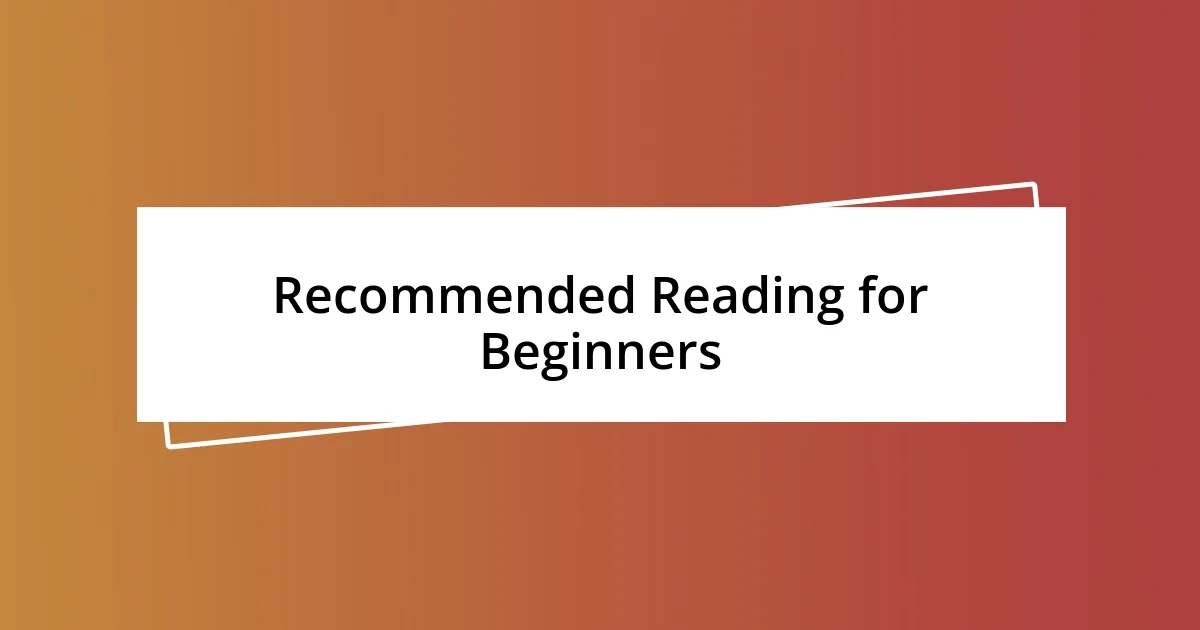
Recommended Reading for Beginners
When recommending reading for beginners, I often suggest starting with “Great Expectations.” It was my first encounter with Dickens, and I remember being mesmerized by the transformation of Pip. His journey from a humble upbringing to unexpected wealth felt relatable, yet full of life’s inexplicable turns. How often do we find ourselves questioning our desires as Pip did? This story beautifully illuminates personal growth and life’s uncertainties.
Another title that should be on your radar is “A Christmas Carol.” I vividly recall reading it during winter holidays, nestled by the fireplace with a warm cup of tea. The story’s themes of compassion and redemption resonate deeply, and it made me reflect on my past choices and relationships. Isn’t it intriguing how a story can challenge your perception of empathy? Dickens’ ability to make us ponder such questions makes this a fantastic entry point.
Lastly, I can’t recommend “Oliver Twist” enough. This was my introduction to Dickens’ exploration of social justice and the plight of the underprivileged. As I turned each page, the harsh realities faced by Oliver and his friends tugged at my heartstrings. It prompted me to consider—how can literature inspire us to take action in the real world? Dickens not only entertains but also compels us to reflect on the social structures that exist around us.












